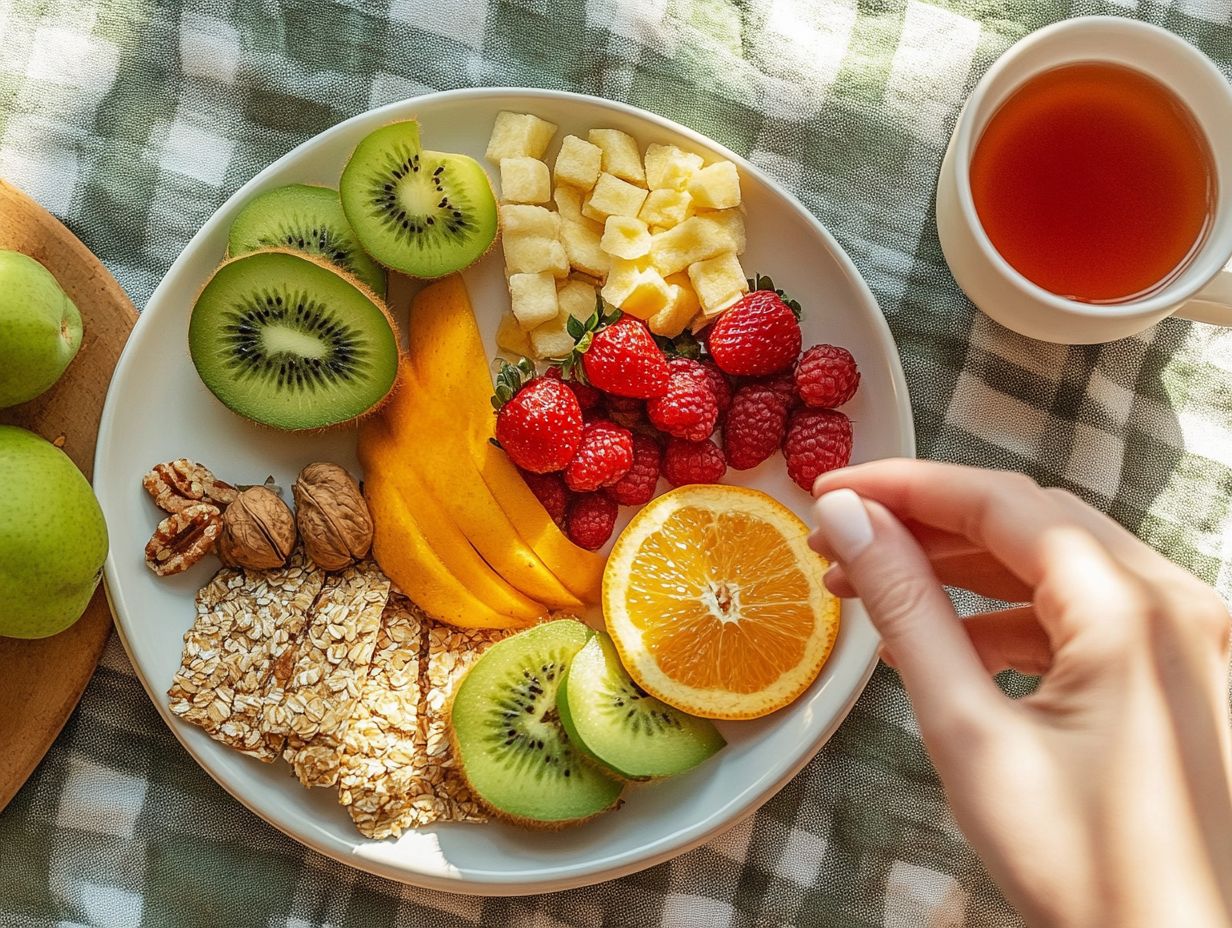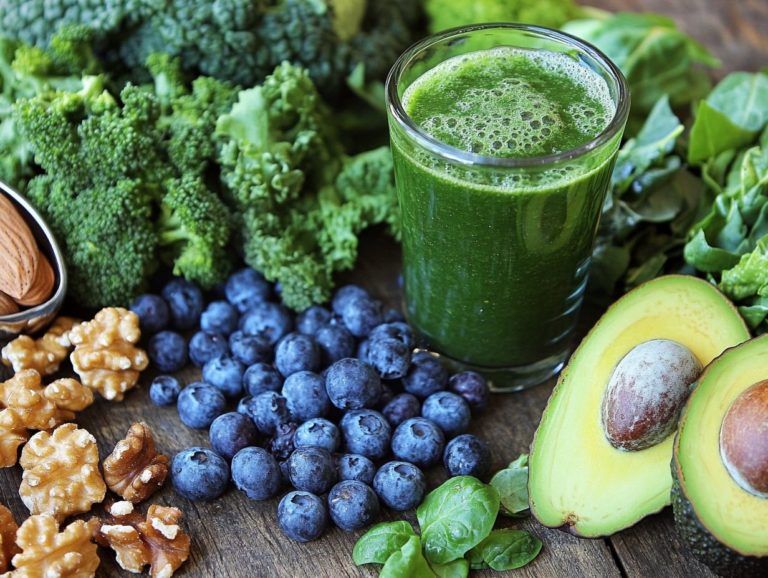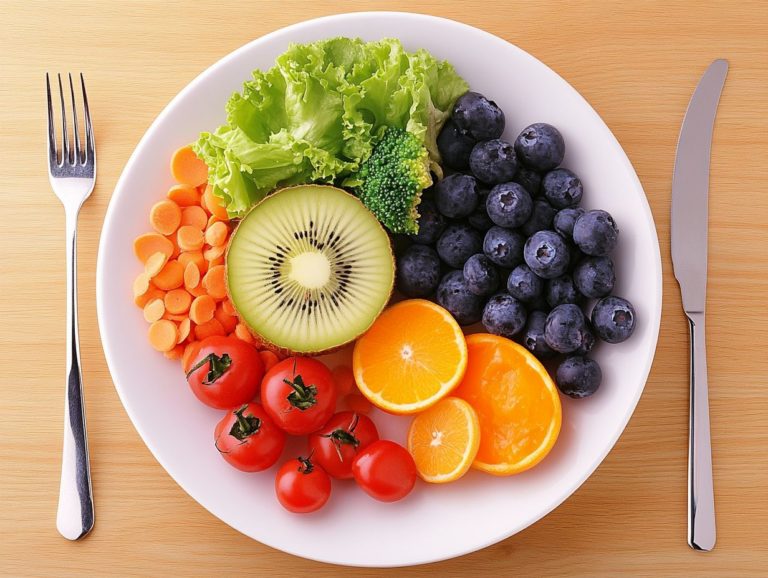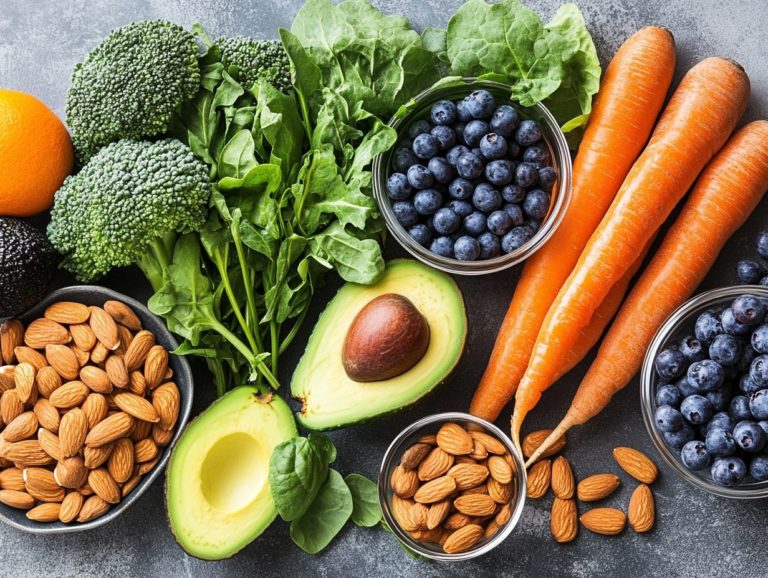Nutrition for Seniors: Tips for Healthy Aging
As you age, maintaining proper nutrition becomes increasingly vital for your overall health and well-being. Discover the key nutrients that can transform your health and ensure a fulfilling life as you grow older.
This article highlights the key nutrients essential for seniors, focusing on the vitamins and minerals crucial for healthy aging. It addresses common nutrition issues, shares practical meal planning tips, and offers strategies for developing healthy eating habits.
Special considerations for those with chronic conditions conditions that last a long time are also discussed. We emphasize the importance of staying hydrated and active.
Explore how proper nutrition can significantly enhance your quality of life during these golden years.
Contents
- Key Takeaways:
- Key Nutrients for Healthy Aging
- Common Nutritional Issues for Seniors
- Meal Planning for Older Adults
- Healthy Eating Habits for Older Adults
- Special Considerations for Seniors with Health Conditions
- Staying Hydrated and Active in Older Age
- Frequently Asked Questions
- What is the importance of nutrition for seniors?
- What are some important nutrients for seniors to include in their diet?
- How can seniors maintain a balanced and healthy diet?
- What are some tips for seniors to stay hydrated?
- How does nutrition affect brain health in seniors?
- What are some common nutrition challenges for seniors and how can they overcome them?
Key Takeaways:

- Proper nutrition is crucial for seniors to maintain health and prevent chronic diseases.
- Key nutrients for healthy aging include vitamins, minerals, and specific dietary needs.
- Meal planning, healthy eating habits, and hydration are essential for overall well-being.
Why Nutrition is Important for Seniors
Nutrition is crucial for your overall health and well-being as you age. It not only helps to slow down the aging process but also provides essential nutrients that support both your physical health and cognitive function.
With the right dietary patterns, you can manage chronic diseases, maintain a healthy weight, and enhance your quality of life.
Good nutrition goes beyond simply eating well; it s about understanding how to create balanced meals that cater to your specific dietary needs and preferences.
A thoughtfully planned diet can significantly lower your risk of conditions like heart disease, diabetes, and hypertension, which are unfortunately common in this age group. By focusing on whole foods think vibrant fruits, colorful vegetables, lean proteins, and hearty whole grains you can boost your energy levels and sharpen your mental clarity.
Being mindful of dietary restrictions is essential. Whether due to allergies, medications, or personal tastes, ensuring that your meals remain both enjoyable and nourishing can foster a sense of independence and control over your health.
This personalized approach can lead to a more fulfilling and vibrant life in your later years.
Key Nutrients for Healthy Aging
Key nutrients are vital for healthy aging, especially for older adults, as they significantly contribute to maintaining physical health and preventing chronic diseases.
Nutrients like fiber, calcium, and vitamin D are crucial for promoting digestive health, enhancing bone strength, and ensuring overall well-being.
Lean protein and healthy fats play essential roles in muscle maintenance and supporting cognitive function, helping you thrive as you age gracefully.
Vitamins and Minerals to Focus On
Older adults should place a strong emphasis on vitamins and minerals like B vitamins, calcium, and vitamin D, as these nutrients are essential for maintaining health and preventing deficiencies. For instance, B vitamins support energy metabolism and cognitive function, while calcium and vitamin D are crucial for bone health.
These nutrients work together to enhance overall wellness, making it vital to understand their specific roles. B12, for example, is essential for nerve health, and ensuring you get enough calcium can significantly reduce your risk of osteoporosis.
The recommended daily allowances suggest that you aim for at least 2.4 micrograms of B12, 1,200 milligrams of calcium, and 800 to 1,000 IU of vitamin D, reflecting your heightened needs as you age. Including foods like leafy greens, dairy products, and fortified cereals in your diet not only provides these essential nutrients but also contributes to a diverse array of health benefits.
Common Nutritional Issues for Seniors
Common nutrition issues for seniors typically center around specific dietary needs, hydration, and essential food safety practices that can profoundly impact their health and daily lives.
You may encounter challenges like a diminished appetite, difficulties with social eating, and an increased susceptibility to foodborne illnesses. These factors underscore the importance of mindful meal planning and preparation, ensuring that nutritional needs are met while promoting overall well-being.
Start making small changes to your meals today for a healthier tomorrow!
Addressing Specific Dietary Needs

Addressing specific dietary needs is vital for older adults. They often face unique medical conditions that necessitate tailored dietary recommendations.
Whether it s managing diabetes, supporting heart health, or alleviating digestive issues, understanding how aging influences nutrient requirements enhances meal planning.
Recognizing how individual health issues affect nutrient absorption is essential. For example, if you have gastrointestinal disorders, certain foods may be difficult to digest. It’s important to choose easily digestible options that still provide essential vitamins and minerals.
Dietary supplements can help fill in missing nutrients from restricted diets. As you create meal plans, consider incorporating nutrient-rich foods like leafy greens, whole grains, lean proteins, and healthy fats.
Adjusting meal timing and portion sizes can further optimize nutritional intake, ensuring dietary needs are met without overwhelming you.
Meal Planning for Older Adults
Meal planning for older adults is crucial for enjoying balanced meals that include a diverse range of food groups.
A well-crafted meal plan can effectively address common challenges like appetite loss, ensuring sufficient vital nutrients for optimal health.
Tips for Creating Balanced and Nutritious Meals
Creating balanced meals for older adults requires effective cooking techniques and mindful food choices that align with dietary guidelines.
For those with limited mobility, meal delivery options are excellent for ensuring access to healthy meals.
To elevate nutritional value, incorporate a variety of colorful fruits and vegetables, choose whole grains over refined alternatives, and select lean proteins.
Cooking methods such as steaming, baking, or grilling help preserve essential nutrients while minimizing added fats.
For healthy fats, opt for olive oil, avocados, and nuts to enhance heart health without sacrificing flavor.
Serving appropriate portion sizes is crucial to prevent overeating and ensure older adults receive essential vitamins and minerals.
Healthy Eating Habits for Older Adults
Establishing healthy eating habits is essential for supporting nutritional intake and overall well-being.
Simple practices like setting mealtime reminders and encouraging community meal participation can enhance dietary patterns and stimulate appetite.
These thoughtful strategies promote better nutrition and foster a sense of connection and engagement in daily life.
Practical Tips for Maintaining a Healthy Diet
Maintaining a healthy diet is about embracing practical tips that respect food preferences, ensure hydration, and encourage social eating experiences.
-
First, consider meal prepping it s a game changer! Devote a few hours each week to prepare nutritious meals for convenience and balanced intake.
-
Next, bring color to your plate! It makes meals visually appealing and ensures a diverse range of nutrients. Don’t forget hydration; sipping water throughout the day is essential. Explore flavorful options like herbal teas or infused waters to make hydration enjoyable.
-
Finally, organize regular mealtime gatherings with friends or family to create a supportive atmosphere. This fosters joy in shared meals and encourages healthier eating habits.
Don’t miss out on the benefits of meal prepping this week! Consult a nutritionist for personalized dietary advice to enhance your health.
Special Considerations for Seniors with Health Conditions

Seniors facing health conditions should carefully consider specialized nutrition strategies to effectively manage chronic diseases and enhance their overall well-being. By tailoring dietary choices to specific medical conditions, they can significantly improve health outcomes and elevate their quality of life.
Nutrition Strategies for Managing Chronic Diseases
Nutrition strategies for managing chronic diseases in older adults often hinge on specific dietary recommendations that cater to their medical conditions. By prioritizing foods rich in nutrients, you can significantly enhance health outcomes and potentially mitigate the effects of chronic diseases.
If you’re dealing with hypertension, adopt a diet abundant in fruits, vegetables, and whole grains while cutting back on sodium. Incorporating foods like spinach, berries, and brown rice can truly work wonders for your heart health.
If you’re managing diabetes, focus on low-glycemic index foods, such as legumes and non-starchy vegetables, to help maintain stable blood sugar levels. Personalized dietary plans not only support metabolic health but also elevate your overall well-being. This makes it crucial for caregivers and healthcare providers to appreciate each individual s unique nutritional needs.
Staying Hydrated and Active in Older Age
Staying hydrated and active is essential for you as an older adult, given the significant role both hydration and physical activity play in your overall health and well-being.
Ensuring proper hydration can help ward off a range of health issues. Engaging in regular physical activity not only enhances your nutrition but also aids in managing chronic diseases effectively.
The Importance of Drinking Enough Water and Staying Physically Active
Drinking enough water and engaging in regular physical activity are essential components of healthy aging, as they cater to your body s hydration needs and counteract the effects of the aging process.
Prioritizing these factors is crucial for preventing chronic diseases and maintaining both physical and cognitive health.
As you age, your body s ability to recognize thirst diminishes. Therefore, it is vital for you to consciously monitor your fluid intake. Aim for approximately 8-10 cups of water daily, which is generally recommended.
Incorporating gentle physical activities like walking, yoga, or swimming not only enhances your mobility but also uplifts your mood and sharpens cognitive function. When you pair these activities with adequate hydration, they create a harmonious effect that fosters overall wellness.
By focusing on both hydration and exercise, you can enjoy improved energy levels, a reduced risk of falls, and an enhanced quality of life. Stay hydrated for a healthier life!
Frequently Asked Questions
What is the importance of nutrition for seniors?

Nutrition plays a crucial role in the overall health and well-being of seniors. As we age, our bodies require different nutrients to maintain muscle mass, bone density, and immune function.
Good nutrition also helps prevent chronic diseases and supports healthy aging.
What are some important nutrients for seniors to include in their diet?
Some key nutrients for seniors include:
- Calcium
- Vitamin D
- Fiber
- Omega-3 fatty acids
These nutrients can help support bone health, heart health, and digestive health, which are all important for healthy aging.
How can seniors maintain a balanced and healthy diet?
One way to maintain a balanced and healthy diet is to follow the USDA’s MyPlate guidelines. This includes filling half of your plate with fruits and vegetables, a quarter with lean protein, and a quarter with whole grains.
It’s also important to limit processed and high-fat foods.
What are some tips for seniors to stay hydrated?
As we age, our sense of thirst decreases. This makes it easy to become dehydrated, so seniors should drink at least 8 cups of water each day.
If you’re physically active or it’s hot outside, increase your water intake. Eating water-rich foods like fruits and veggies also boosts hydration.
How does nutrition affect brain health in seniors?
Nutrition plays a vital role in brain health for seniors. A diet rich in fruits, vegetables, whole grains, and healthy fats helps prevent memory problems.
Focus on nutrients like omega-3 fatty acids and B vitamins, as they are essential for maintaining brain function.
What are some common nutrition challenges for seniors and how can they overcome them?
Seniors often face nutrition challenges, such as changes in taste and appetite. Difficulty preparing meals and medication interactions can also be issues.
To overcome these challenges, use flavorful spices and herbs in meals. Choose easy-to-prepare foods like frozen fruits and vegetables. Consult with a doctor or registered dietitian about potential medication interactions.






